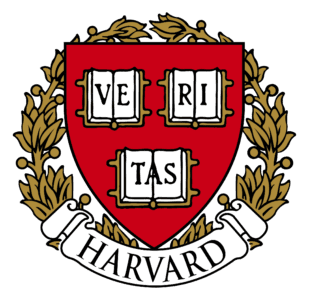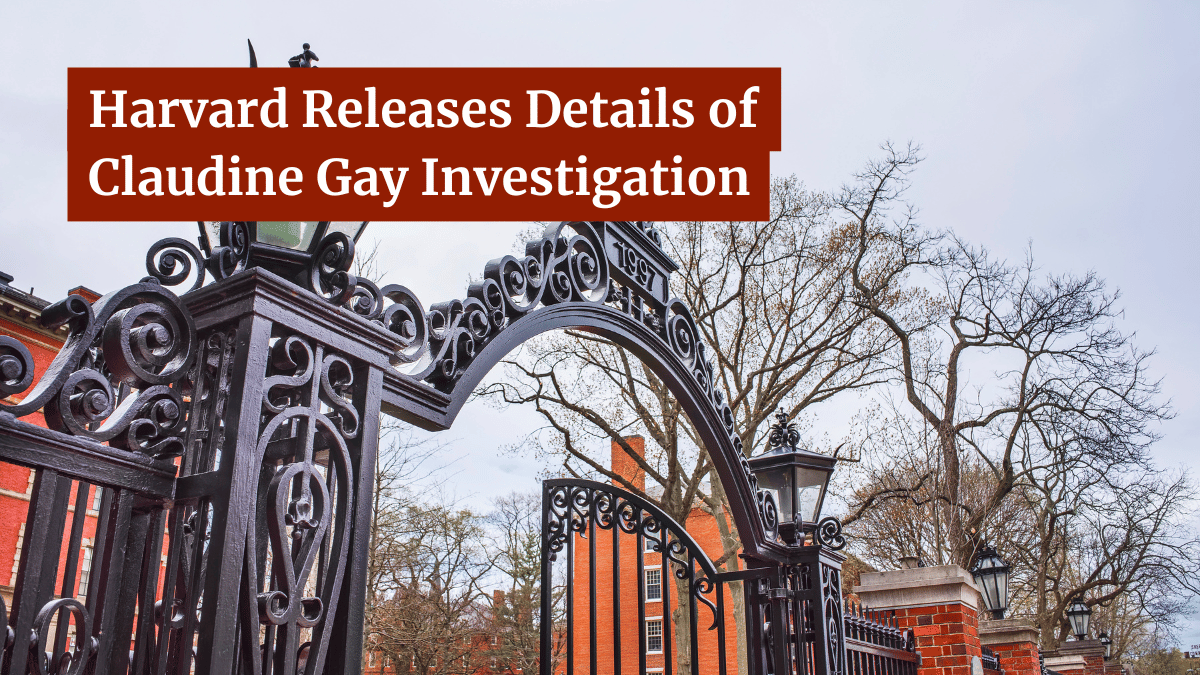Harvard Releases Details of Claudine Gay Investigation

On Friday, Harvard University submitted documents to the House Education and Workforce Committee detailing their investigation into their now-former president Claudine Gay.
Though much of the documents are still private, Harvard has pubilshed an eight-page summary of the process they undertook following the initial allegations.
Gay resigned her presidency on January 3, returning to her position as part of the faculty. Her resignation follows a month-long plagiarism scandal that saw multiple rounds of allegations against her body of work. Though much of the allegations did not carry weight, including in my examination, Gay ordered corrections to several of her works over passages that lacked proper citation.
However, additional allegations were made regarding her dissertation and other early works, raising questions as to why Harvard had failed to spot these issues in the time allotted.
This newly-released summary paints the picture of a university that, despite outward appearances to the contrary, did scramble to perform a thorough investigation. However, that investigation clearly had gaps in it and, despite this summary being made public, still has issues with full transparency.
That said, the report does go a long way to bolster the school’s claims that they did not ignore the allegations and made a good faith effort to respond to them appropriately.
However, in that regard, it’s a lesson to schools that, in the current political climate, there’s a need to go beyond what might seem to be typical for such investigations if you want to get ahead of what outside entities are likely to find and draw attention to.
A Timeline of the Investigation
According to the summary, Harvard learned about allegations from the New York Post on October 24, 2023. Those allegations contained 26 excerpts, two of which dealt with the same passage, resulting in 25 allegations.
The school requested additional time to review the allegations and responded a few days later. However, it kicked off a series of investigations that lasted well into December.
Here is a timeline of that investigation as per the summary (Note: All dates are 2023):
- October 24: Harvard first learns about the plagiarism allegations from the New York Post.
- October 27: Harvard responds to the post “reflecting counsel’s understanding of the information available at that time.”
- October 29: The Harvard Corporation voted to initiate a review of Gay’s work. Gay separately requested an independent review as well.
- Unclear Date: After that, The Corporation convened a subcommittee of fellows who determined that the investigation should include older works of Gay’s, despite a bar on investigating works older than six years.
- November 3: That subcommittee appointed an unnamed independent panel of three political scientists who were not connected with Harvard to create an independent panel. The panel began their review, limited to the existing allegations.
- November 16: That panel provided the subcommittee with a memorandum that indicated, while there was no evidence of intent to violate research integrity standards, that there were nine passages that were “of principal concern” and failed to “provide citations according to the highest established scientific practice.”
- November 20: The independent panel met with the subcommittee to discuss their findings. This concluded the role of the independent panel.
- Unclear Date: After the presentation, the subcommittee initialed their own review of both the nine instances highlighted by the independent panel and of “of then-President Gay’s published work included an assessment of additional instances of potentially duplicative language identified by a software program.”
- December 9: The subcommittee presented its conclusions to the Harvard Corporation. The Corporation required then-president Gay to issue corrections.
- December 10: Harvard learned about allegations involving Gay’s dissertation on social media. The subcommittee had not examined her dissertation up to this point but “promptly reviewed” it and found one issue that had already been corrected and identified “other examples of duplicative language without appropriate attribution.”
- December 12: The Corporation released a statement indicating that their analysis had found “no violation of Harvard’s standards for research.”
- December 14: Gay submitted corrections to two articles highlighted in the original allegations.
- December 19: An additional complaint was filed with the Faculty of Arts and Sciences Research Integrity Office. However, that complaint “primarily included overlapping allegations” that had been corrected elsewhere. As such, it decided no additional corrections were necessary.
Following that, Gay resigned on January 3, 2024. According to the Harvard Corporation, future allegations will be assessed without their involvement since she is no longer president.
What Went Wrong?
What’s clear from this is that Harvard did not limit its investigation to the allegations presented, as it previously appeared. According to the summary, the school did investigate Gay’s body of work, though the details of that investigation are scant. In fact, the part of the summary that talks about that analysis is only two paragraphs long.
That said, the subcommittee met “more than half a dozen times in less than three weeks” and, despite dismissing some of the issues highlighted by the independent panel, did raise one additional issue that required correction.
However, the subcommittee missed an important work: Her dissertation.
One on hand, this is understandable. The goal was to do a review of Gay’s published work and a dissertation would not often be lumped in with that. However, when dealing with political allegations like this one, dissertations are routinely a common target.
To understand this, you only have to look at other countries, where finding plagiarism in dissertations has not only been a powerful tool for ending political careers, but getting degrees revoked.
From an academic perspective, Harvard conducted a seemingly thorough and quick investigation. To be clear, the turnaround time on this, just over six weeks, is incredibly fast for such an investigation and, though the continued lack of transparency makes it difficult to say definitively, it seems to have been reasonably thorough despite the shortened timeline.
The problem for Harvard was that this wasn’t an academic investigation. Those examining Gay’s work weren’t interested in academic or research integrity. They were hoping to force Gay to resign, and plagiarism was simply the mechanism through which they were going to do it.
When you look at it through that prism, Harvard’s response is ill-suited to the task. Though they did look through Gay’s other works, they still spent far too much time and resources on the initial allegations and failed to anticipate what other works might be examined by someone outside of academia.
The mistake is much more understandable, especially considering Gay was not a national figure at the time. However, it still was a serious error that may have cost both Gay and the school dearly.
Bottom Line
Previously, I’ve been very critical of Harvard’s response, saying that, based on the evidence at hand, they only examined the allegations at hand and failed to more deeply examine Gay’s work. After reading this document, I no longer think that is the case.
Harvard still made missteps and there are still transparency issues, but the biggest error was not inaction, but not realizing what the situation was and anticipating where things were likely headed.
They treated the allegations against Gay as if they were any other issue of academic or research integrity. And to be clear, it’s easy to see why they felt as such at the time they were presented. In late October, Gay was not in the national spotlight and was the target of calls for her resignation.
In that regard, this is a warning for other schools and universities. Most likely, your academic and research integrity policies are not well-suited to address the concerns of the public.
As I discussed last week, this heightened interest from the public in these issues is a new normal, at least for the time being. Schools need to adapt their policies and procedures, especially when celebrity, politically sensitive and otherwise divisive members of the faculty are involved.
Academia, as an institution, has historically been slow to change but this is one time in history where quick action is not just recommended, but required.
Want to Reuse or Republish this Content?
If you want to feature this article in your site, classroom or elsewhere, just let us know! We usually grant permission within 24 hours.
